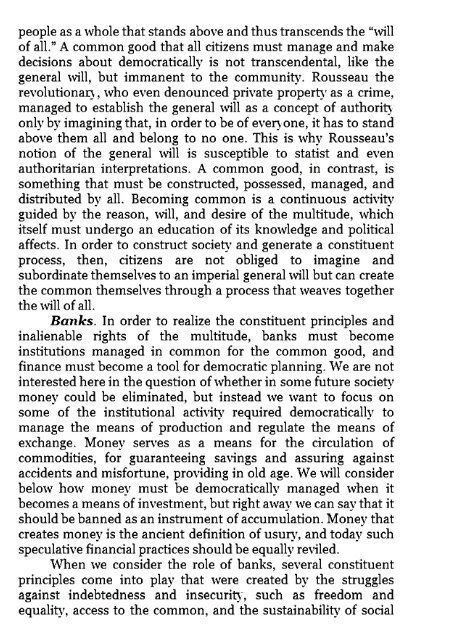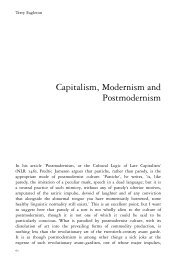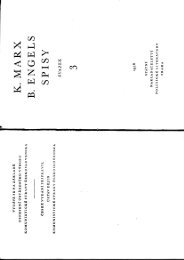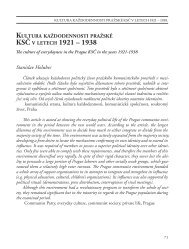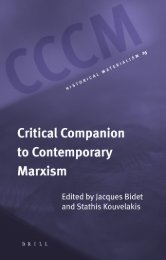Chapter 1: Subjective Figures of the Crisis ... - Negri in English
Chapter 1: Subjective Figures of the Crisis ... - Negri in English
Chapter 1: Subjective Figures of the Crisis ... - Negri in English
You also want an ePaper? Increase the reach of your titles
YUMPU automatically turns print PDFs into web optimized ePapers that Google loves.
people as a whole that stands above and thus transcends <strong>the</strong> "will<br />
<strong>of</strong> all." A common good that all citizens must manage and make<br />
decisions about democratically is not transcendental, like <strong>the</strong><br />
general will, but immanent to <strong>the</strong> community. Rousseau <strong>the</strong><br />
revolutionary', who even denounced private property' as a crime,<br />
managed to establish <strong>the</strong> general will as a concept <strong>of</strong> authority'<br />
only by imag<strong>in</strong><strong>in</strong>g that, <strong>in</strong> order to be <strong>of</strong> ever}'one, it has to stand<br />
above <strong>the</strong>m all and belong to no one. This is why Rousseau's<br />
notion <strong>of</strong> <strong>the</strong> general will is susceptible to statist and even<br />
authoritarian <strong>in</strong>terpretations. A common good, <strong>in</strong> contrast, is<br />
someth<strong>in</strong>g that must be constructed, possessed, managed, and<br />
distributed by all. Becom<strong>in</strong>g common is a cont<strong>in</strong>uous activity<br />
guided by <strong>the</strong> reason, will, and desire <strong>of</strong> <strong>the</strong> multitude, which<br />
itself must undergo an education <strong>of</strong> its knowledge and political<br />
affects. In order to construct society and generate a constituent<br />
process, <strong>the</strong>n, citizens are not obliged to imag<strong>in</strong>e and<br />
subord<strong>in</strong>ate <strong>the</strong>mselves to an imperial general will but can create<br />
<strong>the</strong> common <strong>the</strong>mselves through a process that weaves toge<strong>the</strong>r<br />
<strong>the</strong> will <strong>of</strong> all.<br />
Banks. In order to realize <strong>the</strong> constituent pr<strong>in</strong>ciples and<br />
<strong>in</strong>alienable rights <strong>of</strong> <strong>the</strong> multitude, banks must become<br />
<strong>in</strong>stitutions managed <strong>in</strong> common for <strong>the</strong> common good, and<br />
f<strong>in</strong>ance must become a tool for democratic plann<strong>in</strong>g. We are not<br />
<strong>in</strong>terested here <strong>in</strong> <strong>the</strong> question <strong>of</strong> whe<strong>the</strong>r <strong>in</strong> some future society<br />
money could be elim<strong>in</strong>ated, but <strong>in</strong>stead we want to focus on<br />
some <strong>of</strong> <strong>the</strong> <strong>in</strong>stitutional activity required democratically to<br />
manage <strong>the</strong> means <strong>of</strong> production and regulate <strong>the</strong> means <strong>of</strong><br />
exchange. Money serves as a means for <strong>the</strong> circulation <strong>of</strong><br />
commodities, for guarantee<strong>in</strong>g sav<strong>in</strong>gs and assur<strong>in</strong>g aga<strong>in</strong>st<br />
accidents and misfortune, provid<strong>in</strong>g <strong>in</strong> old age. We will consider<br />
below how money must be democratically managed when it<br />
becomes a means <strong>of</strong> <strong>in</strong>vestment, but right away we can say that it<br />
should be banned as an <strong>in</strong>strument <strong>of</strong> accumulation. Money that<br />
creates money is <strong>the</strong> ancient def<strong>in</strong>ition <strong>of</strong> usury, and today such<br />
speculative f<strong>in</strong>ancial practices should be equally reviled.<br />
When we consider <strong>the</strong> role <strong>of</strong> banks, several constituent<br />
pr<strong>in</strong>ciples come <strong>in</strong>to play that were created by <strong>the</strong> struggles<br />
aga<strong>in</strong>st <strong>in</strong>debtedness and <strong>in</strong>security', such as freedom and<br />
equality, access to <strong>the</strong> common, and <strong>the</strong> susta<strong>in</strong>ability <strong>of</strong> social


